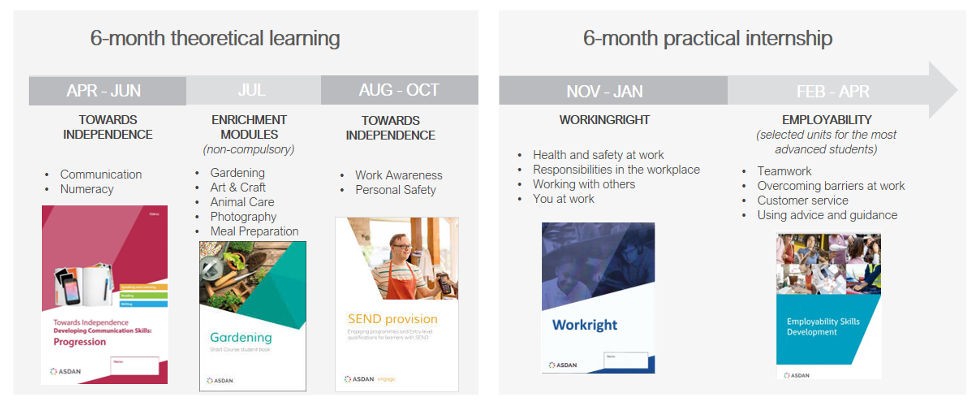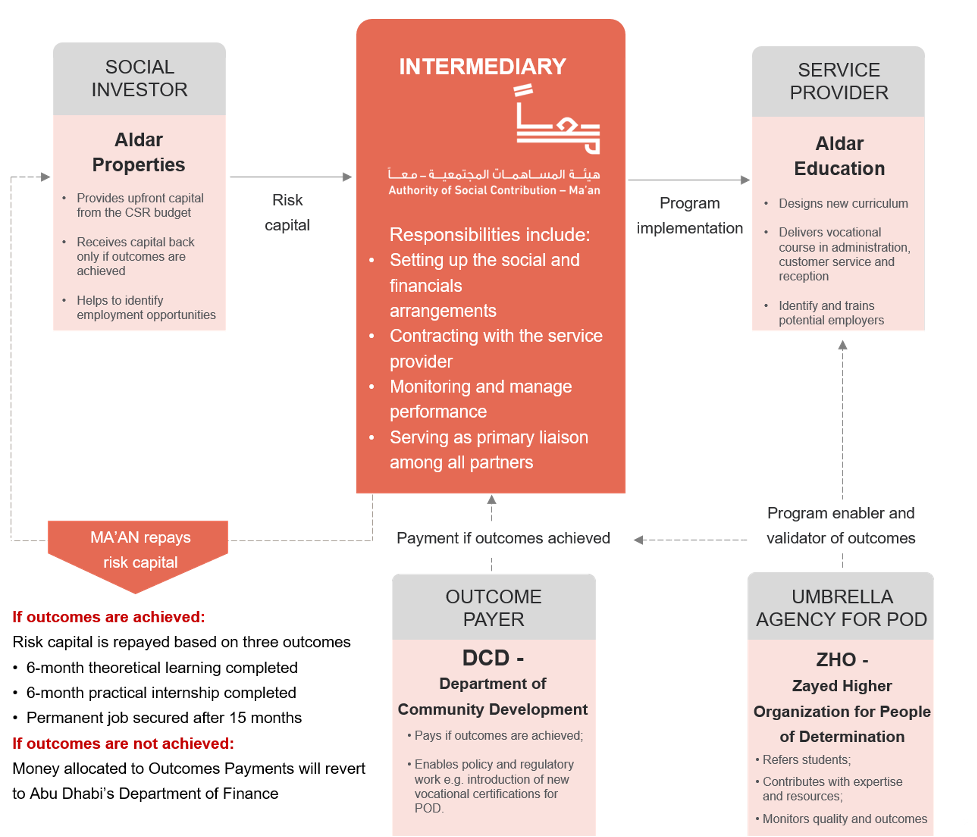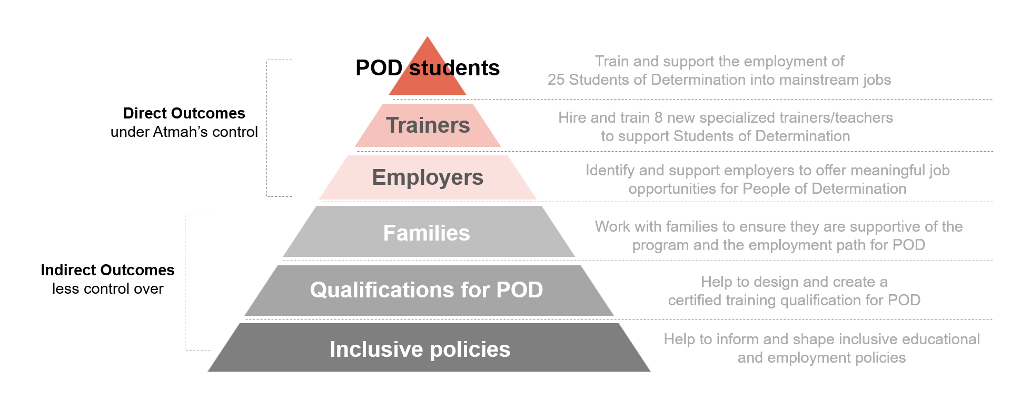
- Impact bond
- Education
- Employment and training
- Asia
Abu Dhabi, United Arab Emirates
6 mins
Atmah SIB
Last updated: 4 Nov 2021
Abu Dhabi's Atmah SIB is the first social impact bond in the Gulf region. It provides education, vocational training and employment support to a small cohort of students with cognitive impairments.
Project Location
Aligned SDGs


INDIGO Key facts and figures
-
INDIGO project
-
Commissioner
-
Intermediary
-
Investor
-
Provider
-
Start of service provision
April 2020
-
Duration
1 year, 2 months
-
Capital raised (minimum)
AED 2m
(USD 544.59k)
-
Service users
25
Target population
25 students of determination with learning disabilities.
The problem
‘People of determination’ (PoD) is the term used in Abu Dhabi to refer to disabled people. According to the Abu Dhabi Quality of Life Survey 2019, PoDs have the lowest level of life satisfaction compared to other segments of society. Those with cognitive impairments were found to be especially excluded.
While there have been huge strides towards greater inclusion within Abu Dhabi’s mainstream schools, there is still a lack of professionals who are trained to support PoD students. Families often have to pay for additional support in mainstream schools, but the high costs mean that inequalities are compounded. Even if families can afford to pay, there is no accreditation system for these support professionals, and therefore no guarantee of quality.
The Zayed Higher Organisation for People of Determination (ZHO) is the Government entity in Abu Dhabi functioning as an umbrella for all humanitarian bodies, social services, PoD institutions and any future bodies established in Abu Dhabi for humanitarian goals focusing on PoD children. ZHO provides an array of services and support such as therapeutic and care programmes. There is some provision of training and education, albeit in specialised settings. However, demand consistently exceeds supply, and ZHO identified a challenge of getting PoD students out of their centres and into jobs.
The solution
A 2019 survey by the SEDRA Foundation found that 93% of families with children or young people who are PoD expressed keen interest in culturally-appropriate vocational education opportunities for their children. It is within this context that Al Dar Education (a leading education group in Abu Dhabi) and Al Dar Academies (a leading provider of private education in the UAE) were inspired to draw upon their extensive experience of educational provision to extend into high quality vocational education for PoD students. The significance of these players should be understood in the context that in Abu Dhabi, around 35% of the student population are enrolled in public education, compared to around 65% in the private system.
The Atmah Social Impact Bond involves 25 PoD students, and provides them with education and vocational training. Ultimately, the project aims to help service users gain sustainable employment.
The ASDAN curriculum is being tested for local implementation. ASDAN is a British education charity and awarding organisation. It provides curriculum programmes and qualifications to help young people develop knowledge and skills for learning, work and life. The adaptation of the ASDAN curriculum in Abu Dhabi is centred on giving all learners the opportunity and tools to discover, develop and make full use of their potential.
A 12-month programme combining theoretical learning and practical internship covers the components illustrated in Figure 1 (below). Once an individual moves into employment, further bespoke support is provided not only to the person at work but also to the relevant employer.
The impact
The 6-month interim results were announced in November 2020. All 25 Atmah students have achieved the first milestone of the 6-month theoretical learning outcome successfully. This outcome is defined based on the following criteria:
- All the 3 ASDAN learning modules completed and passed
- Attendance of at least 75%, averaged across the 6 months
- Satisfactory completion of a second interview with potential employers in preparation for internship
- Completion of a baseline assessment
These results were verified independently by ZHO.
Endline results were expected to be published December 2021. However, in order to gather a greater sense of wider outcomes beyond the payment outcomes, so the timescale has been extended. It is expected to be published towards the end of 2022.

SIB Structure

Outcomes framework
There are three outcomes tied to the repayment of risk capital in the Atmah SIB:
- 6-month theoretical learning completed
- 6-month practical internship completed
- Permanent job secured after 15 months
However, the approach towards outcomes in the Atmah SIB goes beyond the specific metrics that trigger payment described above, and reflects a more holistic approach towards inclusion. It recognises that different stakeholders will have a different perspective of what ‘success’ looks like and will have different roles to play along the journey towards greater inclusion (see Figure 3).

Timeline
-
October 2019
Feasibility assessment
-
March 2020
Contracts signed
-
April 2020
Service provision starts
-
November 2020
6-month interim results report
-
July 2021
Service provision due to end
-
October 2021
Final evaluation report expected
Project insights
Starting with an in-depth analysis of root causes and prioritisation of social challenges
The development of the Atmah SIB began with the Department of Community Development (DCD), who built up a detailed evidence base of the social issues terrain in Abu Dhabi. This evidence was benchmarked against a number of international indices and frameworks. In-depth analyses led to an initial long-list of 40 social challenges, further distilled into 20, after a criteria-based prioritization process.
6 of these were cascaded down to Ma’an: the Authority of Social Contribution, an entity with the mandate to introduce new forms of social impact contracting such as SIBs. One of these was ‘Inclusion’, with a specific focus on breaking down barriers to socio-economic inclusion confronting ‘people of determination’.
SIBs are not the panacea for tackling all forms of social challenges. Ma’an conducted a detailed feasibility assessment, informed by a granular understanding of the key social challenges. This led to a decision to implement a SIB with very specific objectives of facilitating wider system change. These are discussed below.
Building capacity for social outcomes in the local ecosystem
Ma’an: the Authority of Social Contribution was established in February 2019 in the Emirate of Abu Dhabi with the aim of bringing together the government, the private sector and civil society to support a culture of social contribution and participation. Ma’an will deliver solutions for social challenges with five pillars of work: a Social Investment Fund, a Social Incubator programme, a Social Volunteering programme, Social Impact Contracting Programme, as well as Outreach Management.
For Ma’an, with their mandate to embed social outcomes thinking and planning In Abu Dhabi, there is recognition of significant gaps in the local ecosystem. As the nascent hub for knowledge and expertise in this area, Ma’an has positioned itself as an intermediary whose role is to coordinate and steer cross-sector partnerships in a way that maximizes potential impact while minimizing implementation risks. The Atmah SIB is thus a vehicle through which Ma’an can expose local players to innovative tools for facilitating social outcomes, thereby building knowledge, confidence and capacity in the local ecosystem to mainstream outcomes-focused approaches over the longer term.
The process of designing the Atmah SIB was used to generate wider interest and to raise awareness of social contracting and social financing, beyond the specific partners that entered into the SIB contract. Ma’an engaged with a much larger pool of stakeholders, particularly targeting system actors that will have a role in embedding some of the lessons from the SIB in national policy and practice.
Systemic change through collaboration
While there is ambition to develop first-in-class and at-scale inclusive provision in Abu Dhabi eventually, there is recognition among project stakeholders and the Abu Dhabi Government that “Rome wasn’t built in a day”. The Atmah SIB is thus a cross-sector collaboration intended to tackle an entrenched social challenge through a “start small, aim big” approach, involving players that will be instrumental in forging the longer-term vision.
The Abu Dhabi journey hints at the possibilities if SIBs are designed with a system-level underpinning rather than as a discrete project-level innovation. The Atmah SIB is designed and being executed so as to inform the way the Government and project stakeholders upscale the intervention nationally post-SIB. It will further improve the understanding of appropriate forms of funding structures to support such large-scale replication. Outcomes are defined not only in terms of the needs and requirements of the specific actors involved in the SIB, but also the wider and longer-term building blocks for system reconfiguration that will support improvement at scale. This alerts us to the need to mobilise system actors, and not just project stakeholders.
While the Atmah SIB only involves 25 PoD students, the outcome pricing has little to do with the specific costs relating to provision for these 25 students per se. Stakeholders took into consideration not only the costs of provision, but also the opportunity cost to society as a result of exclusion from economic productivity, as well as the costs to families in supporting PoD children. Indeed, it can be argued that the SIB attempts to shift an expenditure that currently falls upon families onto the Government. The SIB can be understood as being motivated by social value, and not fiscal value, aimed at achieving genuine inclusion of an excluded group over time.
The word ‘Atmah’ translates broadly into ‘aspire’. The Atmah SIB is not simply about encouraging the aspirations of PoD students or their families, but is also emblematic of a wider aspiration for Abu Dhabi society to embrace inclusion.
This case study was developed by Dr Chih Hoong Sin, Director of Social Investment at Traverse and Knowledge Partner to Ma’an.
Last updated: October 2021
Contact details
Downloads and Resources
Atmah SIB Case Study - Arabic
Download PDF